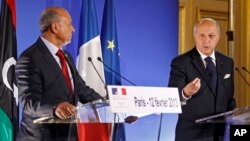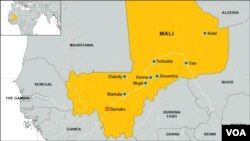PARIS —
Libya's Foreign Minister Mohammed Abdelaziz on Tuesday called for Western and Arab allies to help seal his country's borders to stop defeated Islamist rebels coming in from Mali and further destabilising the strife-hit oil producer.
Tripoli's government, already struggling to impose security two years after the overthrow of Moammar Gadhafi, is worried al-Qaida-linked fighters pushed out of Mali by a French-led offensive could seek refuge in its vast desert territory.
Several Islamist and separatist rebel groups have already taken advantage of the chaos surrounding the fighting in Mali, and the 'Arab Spring' overthrow of Gadhafi and other autocrats, to build up their arsenals and move freely back and forth over North and West Africa's unprotected borders.
The Malian crisis - where rebel groups seized the northern two-thirds of the country last year, raising fears they could turn it into a base for militant attacks - was itself in part triggered by an influx of tribal fighters originally armed in Libya.
"If we want to prevent them coming back, we have to seal the borders,'' Abdelaziz said after a meeting in Paris between the countries that helped oust Gadhafi.
France convened delegations from the United States, Britain, Arab nations, the United Nations and European Union to discuss ways to stabilize Libya, though nothing tangible appeared to have been decided.
Speaking to Reuters, Abdelaziz said he had received pledges from France, Britain, Turkey and other countries to provide technical support and equipment, but more needed to be done to secure his country's 4,000-km frontier.
"We cannot move trained people without technology that is developed enough for surveillance or to patrol the borders properly. We won't be able to secure them. We have to agree later on between those countries and us which services we have to pay for and which are the services that can be given to us for free," he said.
Abdelaziz said there was no evidence rebels had already left Mali and crossed into Libya via Algeria.
He also declined to give estimates of the cost of protecting the border. In 2009, fellow OPEC producer Saudi Arabia awarded a $1 billion contract to build a razor-wire fence along its 900-km frontier with Iraq.
Stable Libya, stable Europe
France's decision to send troops to its former colony Mali to help drive the rebels back last month has cranked up tensions in the region, with Islamist radicals vowing to strike back at French and Western interests.
Al-Qaeda-linked insurgents killed 38 mostly foreign hostages last month when they seized an Algerian gas plant as a riposte to France's intervention. Some of those fighters had entered Algeria from southern Libya.
''We're all convinced that the question of security is for all these neighboring countries," French Foreign Minister Laurent Fabius said at the meeting in Paris. ''By helping Libya's security we are helping our security."
European countries, which are due to send a border management mission to Libya by June, are also concerned about security within the country.
They urged their nationals to leave Libya's eastern city of Benghazi on Jan. 24 after Britain cited a ''specific and imminent`` threat to Westerners days after the Algerian attack.
The call to leave Libya's second largest city irked Libyans keen to win foreign investment to rebuild a fractured infrastructure and boost the oil industry after the revolution.
Tripoli's government, already struggling to impose security two years after the overthrow of Moammar Gadhafi, is worried al-Qaida-linked fighters pushed out of Mali by a French-led offensive could seek refuge in its vast desert territory.
Several Islamist and separatist rebel groups have already taken advantage of the chaos surrounding the fighting in Mali, and the 'Arab Spring' overthrow of Gadhafi and other autocrats, to build up their arsenals and move freely back and forth over North and West Africa's unprotected borders.
The Malian crisis - where rebel groups seized the northern two-thirds of the country last year, raising fears they could turn it into a base for militant attacks - was itself in part triggered by an influx of tribal fighters originally armed in Libya.
"If we want to prevent them coming back, we have to seal the borders,'' Abdelaziz said after a meeting in Paris between the countries that helped oust Gadhafi.
France convened delegations from the United States, Britain, Arab nations, the United Nations and European Union to discuss ways to stabilize Libya, though nothing tangible appeared to have been decided.
Speaking to Reuters, Abdelaziz said he had received pledges from France, Britain, Turkey and other countries to provide technical support and equipment, but more needed to be done to secure his country's 4,000-km frontier.
"We cannot move trained people without technology that is developed enough for surveillance or to patrol the borders properly. We won't be able to secure them. We have to agree later on between those countries and us which services we have to pay for and which are the services that can be given to us for free," he said.
Abdelaziz said there was no evidence rebels had already left Mali and crossed into Libya via Algeria.
He also declined to give estimates of the cost of protecting the border. In 2009, fellow OPEC producer Saudi Arabia awarded a $1 billion contract to build a razor-wire fence along its 900-km frontier with Iraq.
Stable Libya, stable Europe
France's decision to send troops to its former colony Mali to help drive the rebels back last month has cranked up tensions in the region, with Islamist radicals vowing to strike back at French and Western interests.
Al-Qaeda-linked insurgents killed 38 mostly foreign hostages last month when they seized an Algerian gas plant as a riposte to France's intervention. Some of those fighters had entered Algeria from southern Libya.
''We're all convinced that the question of security is for all these neighboring countries," French Foreign Minister Laurent Fabius said at the meeting in Paris. ''By helping Libya's security we are helping our security."
European countries, which are due to send a border management mission to Libya by June, are also concerned about security within the country.
They urged their nationals to leave Libya's eastern city of Benghazi on Jan. 24 after Britain cited a ''specific and imminent`` threat to Westerners days after the Algerian attack.
The call to leave Libya's second largest city irked Libyans keen to win foreign investment to rebuild a fractured infrastructure and boost the oil industry after the revolution.















